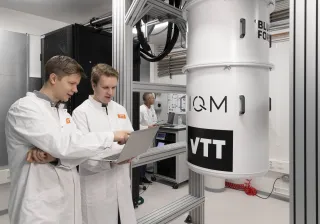A public test network will be built in the Helsinki Metropolitan Area, which will enable the introduction of quantum encryption technologies. It will also offer Finnish companies a platform for developing and testing services and products based on quantum encryption. Quantum encryption is a new method based on quantum mechanics that enables secure data transfer in the era of quantum computers. In the future, the national quantum encryption network will be connected to the EU-wide network. The project led by VTT Technical Research Centre of Finland includes Suomen Erillisverkot Oy, Cinia Oy and CSC – IT Center for Science.
Cybersecurity is essential to ensure the functioning of our society in a world where all important infrastructure depends on effective and secure data transfer. Threats are created by state actors, criminal organisations and individual actors.
The EU's EuroQCI initiative launched at the beginning of the year aims to build a Union-wide quantum encryption network by the end of the decade. The initiative aims to protect European critical infrastructures such as administrative functions, data centres, hospitals and energy networks. In the first phase about to begin, the aim is to build national test networks in each EU country and so create the competence needed to build operational networks.
“Quantum encryption is a new technology in which information is transmitted in the smallest possible parts – quantum – that cannot be copied. Their absence is also detected immediately, which would reveal a potential break-in attempt. Building a quantum encryption test network in Finland makes it possible to strengthen the cyber security infrastructure as part of an EU-wide system,” says NaQCI.fi Project Manager, Principal Scientist Kari Seppänen from VTT.
In Finland, VTT and CSC are responsible for the construction of the test network. It is implemented with the help of ready-made commercial devices. In addition to the public test network, the project will also build a test network for use by the authorities. Cinia and Suomen Erillisverkot Oy are responsible for its implementation. The test networks will be completed in the first half of 2024. The EU-wide network is expected to be in place by the end of the decade.
“Integrating quantum encryption into modern network services will increase in the future. Cinia finds it important to be involved in the development and provision of high-security information network services that the most critical actors in society will need in the future,” explains Pertti Hyvärinen, Senior Vice President Business Development at Cinia Oy.
“Suomen Erillisverkot Oy wants to be active in safeguarding Finnish society against future cyber security threats. It is great to be involved in this joint project led by VTT,” says CEO Timo Lehtimäki.
In addition to the public test network, VTT is building an open trial system for quantum encryption. It can be used to develop and experiment with new components, quantum encryption methods and security analyses. The experimental system can also be used to develop software for quantum encryption test networks and to train new experts in the principles of quantum encryption. The system is built from individual components and software developed at VTT.
Quantum encryption is based on individual photons
Quantum computing is creating a new kind of threat to encryption mechanisms, as it enables effective attacks against several encryption mechanisms considered to be break-in safe from the point of view of classical computing. Quantum encryption provides a solution to these problems – the exchange of encryption keys based on quantum mechanics, which is basically impossible to break.
“We need to change our current methods for digital communication, especially for transferring sensitive data. CSC will pilot the use of quantum-secure communications for connecting end-users like hospitals, bio banks, and universities to our sensitive data services,” says Mikael Johansson, Manager for Quantum Technologies at CSC.
In quantum encryption, the exchange of encryption keys is based on the transmission of individual photons between the sender and the receiver. Because the key information to be transmitted is encoded in these individual photons, any eavesdropping can be detected by observing key transfer errors. This ensures that the keys transmitted using this method have not been compromised during the transfer. The keys can be used with existing encryption algorithms, but even higher security levels can be achieved by combining Quantum Key Distribution (QKD) and Post-Quantum Cryptography (PQC). Finland is at the forefront of PQC development. Disposable keys can be created when extreme safety is required.
Goals: Joining the EU network and raising awareness through workshops
The project is part of an entity in which national quantum encryption networks are set up in EU countries. In the next phase, the aim is to connect the networks with cross-border links. For this purpose, the availability of fibre connections between existing countries will be examined and preliminary experimental arrangements will be planned. In addition, the project will examine how a satellite-based quantum encryption system would suit Finnish conditions. This focuses in particular on potential problems related to satellite visibility and optical signal perception. In addition, the coordination of quantum encryption key management systems and the control and management mechanisms of quantum encryption test networks will be investigated using the necessary interfaces. Related information security and liability challenges will also be investigated.
The aim of the project is also to raise awareness of the applications of quantum encryption methods and to train more researchers and technical experts familiar with the topic through seminars and workshops. The public test network and the test system are utilised in the training. The project makes an effort to increase the number of future experts in co-operation with Finnish educational institutions.
More information about the project: https://www.naqci.fi/
Further information
Kari Seppänen, Principal Scientist, VTT
Pertti Hyvärinen, Senior Vice President Business Development, Cinia Oy
Timo Lehtimäki, CEO, Erillisverkot Oy
Mikael Johansson, Manager for Quantum Technologies, CSC








